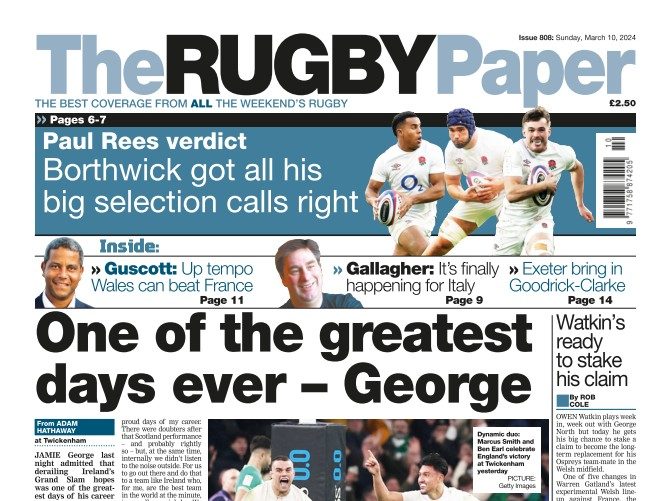In an era where sports fandom extends far beyond the sidelines, fantasy sports have emerged as a thrilling arena that blurs the line between fan and participant. Among these, Fantasy Rugby is fast becoming a fan favorite, offering a distinct blend of strategic planning and in-depth sports knowledge. Like its more renowned counterparts—fantasy football and basketball—Fantasy Rugby transforms spectators into team managers, making critical decisions that can lead to either glory or defeat. The rise of fantasy sports is a testament to today’s digital age, where the love for sports is no longer confined to watching games but also involves active participation and strategic gameplay. In this comprehensive guide, we will navigate the exciting world of Fantasy Rugby. We’ll delve into the strategies unique to rugby, offer insightful tips on player selection, and provide a wealth of information designed to help you build a winning team for the upcoming season. So, whether you’re a novice or a seasoned player, fasten your seatbelts and get ready for an exhilarating ride into the dynamic realm of fantasy rugby.
Understanding the Game
Understanding the game of rugby is paramount in excelling at Fantasy Rugby. Rugby is a dynamic game with a set of rules that govern how points are scored, and these rules directly translate into fantasy points. For instance, in real-life rugby, points are awarded for tries (5 points), conversions (2 points), penalty kicks, and drop goals (3 points each). These same actions earn you fantasy points when the players in your team perform them in their actual games. However, remember that negative points can also be accrued, such as through penalties or yellow/red cards.
Now, let’s move on to player positions – another crucial aspect of understanding the game. A rugby team is divided into two main groups: forwards (players numbered 1-8) and backs (players numbered 9-15). The forwards, typically larger and stronger, are the team’s powerhouse, responsible for winning possession of the ball, particularly in scrums and lineouts. On the other hand, the backs are generally quicker and more agile, often tasked with exploiting the possession won by the forwards to score tries. In Fantasy Rugby, understanding these positions helps you choose a balanced team, with both power and pace, to maximize your chances of scoring points across different areas of play.
Building Your Team
Building a formidable Fantasy Rugby team requires careful consideration of several factors. Firstly, pay close attention to player statistics. These include a player’s scoring history, their performance in recent matches, and their overall consistency. A player who regularly scores tries or assists is likely to earn you more points than one who doesn’t.
Secondly, consider the team’s overall performance. A player from a high-performing team is more likely to provide assists, score tries, and win matches, all of which translate into fantasy points. Additionally, keep an eye on player injuries. An injured player, no matter how good, won’t earn you any points. So, it’s important to stay updated on player health and make changes to your team accordingly.
Lastly, while it might be tempting to fill your team with star players, they are usually more expensive and can use up your budget quickly. Therefore, finding a balance is key. Consider potential breakout players – those who may not have made big headlines but show promise in their skills and performance. These players are often cheaper and could provide great value for money if they perform well. This balance between proven stars and emerging talent could be the strategy that leads your Fantasy Rugby team to victory.
Mastering Team Formations
Mastering team formations is another critical aspect of winning at Fantasy Rugby. In real-world rugby, popular team formations include the 2-4-4, 1-3-3-1, and the 1-3-2-2. The 2-4-4 formation, for example, is known for its strength in attack, with forwards focusing on ruck security while backs exploit space on the field. The 1-3-3-1 formation offers a balanced approach, providing both attacking and defensive options, while the 1-3-2-2 formation is praised for its flexibility and adaptability to different game situations.
When choosing a formation for your fantasy team, consider the skills of your players and the strategies of opponents. If you have strong forwards, a 2-4-4 formation might allow them to shine. However, if your team is rich in agile backs, a 1-3-3-1 formation could enable them to score more tries. It’s also important to look at your opponent’s strategies. For instance, if they have a defense-heavy team, a formation that emphasizes attack might give you an edge. Remember, there’s no one-size-fits-all strategy. The key is to adapt your formation to maximize your team’s strengths and exploit your opponent’s weaknesses.
Offensive Strategies
Offensive strategies play a crucial role in amassing points in Fantasy Rugby. To maximize points through offensive plays, you need to select players who are likely to score tries, make assists, kick conversions, penalties, or drop goals, as these actions all earn fantasy points. Consider the player’s past performance, their position on the field, and their role within their real-world team when making your selection.
In terms of player roles, backs typically play a significant part in the offense. Positions like the fly-half, inside center, and outside center often take on pivotal roles in setting up and executing attacking plays. Therefore, they may be key players to consider for your Fantasy Rugby team. Wingers and full-backs, with their speed and agility, are often the ones who finish the plays by scoring tries. Picking high-performing players in these positions could give your team a significant offensive advantage.
However, forwards can also contribute significantly to offensive plays, particularly through winning possession and providing support in rucks and mauls. So, don’t overlook the importance of having strong forwards in your team. A successful offensive strategy in Fantasy Rugby is about understanding player roles and choosing a balanced team that can score points in various ways.
Defensive Strategies
In Fantasy Rugby, a robust defensive strategy is just as crucial as an offensive one. The strength of your team’s defense can significantly impact the number of points your opponent scores. Players who excel in tackles, turnovers, and defensive rucks can prevent the opposing team from scoring tries, making successful passes, or gaining ground, thereby minimizing the points they earn.
When building your fantasy team, consider including players known for their defensive prowess. Positions that typically play critical roles in defense include the flankers and the hooker in the forward pack, who are often involved in winning possession and making tackles. On the backs, the inside and outside centers are vital for preventing breakaways and making crucial tackles.
Consider players who have high tackle success rates and those who regularly win turnovers. A player’s past performance in these areas could be a good indicator of their defensive abilities. Thus, while it’s important to choose players who can score points, don’t underestimate the value of those who can prevent them. After all, in Fantasy Rugby, a good defense can be a strong offense.
The Art of Tackling
A successful tackle not only prevents the opposing team from advancing but also earns your team fantasy points. Furthermore, players who consistently perform high numbers of successful tackles can be invaluable assets to your team, as each tackle adds up and can make a considerable difference in your overall score.
When selecting players for your team, consider those known for their excellent tackling skills. Typically, these are players in positions where they frequently encounter opposition with the ball, such as flankers and centers. For example, Sam Underhill, an English flanker, is renowned for his tackling prowess. Similarly, Jonathan Davies, a Welsh center, is another player noted for his consistent and effective tackling. By including players known for their tackling abilities, you not only strengthen your team’s defense but also increase its potential for scoring points. The art of tackling, therefore, is a vital factor to consider in your Fantasy Rugby strategy.
The Importance of Adaptability
The importance of adaptability in Fantasy Rugby cannot be overstated. As the season progresses, numerous variables can change – players might get injured, teams could go on winning or losing streaks, and individual performances may fluctuate. Therefore, flexibility in strategies is paramount. Sticking to a rigid strategy without considering these changes can leave your team at a disadvantage.
Successful Fantasy Rugby managers are those who adapt their strategies based on the current landscape of the game. For instance, if a key player gets injured, they quickly find a suitable replacement rather than sticking with the injured player and losing points. Similarly, if a previously underperforming team starts performing well, they might decide to include more players from that team in their roster.
A notable case study of a successful strategy shift in Fantasy Rugby comes from the 2019 season. An astute manager noticed the stellar performance of the Japanese team during the Rugby World Cup and quickly adapted his strategy to include more Japanese players. This decision paid off as Japan reached the quarter-finals for the first time, and the manager’s team significantly benefited from the points scored by these players. This underscores the importance of adaptability in Fantasy Rugby – the ability to respond to changes swiftly and effectively can make the difference between winning and losing.
Conclusion
In conclusion, strategic planning forms the bedrock of success in Fantasy Rugby. It’s not just about selecting the best players; it’s about understanding the dynamics of rugby, analyzing opponents, and making informed decisions based on player performances and team strategies. As the season progresses, the game landscape evolves, necessitating the need for flexibility and adaptability in your approach.
Moreover, Fantasy Rugby is not a static game, but a journey of continuous learning and adaptation. Each match provides new insights, each week presents new challenges, and each season brings new opportunities. The most successful managers are those who embrace this dynamic nature of the game, constantly learning from their experiences, adapting their strategies, and making adjustments when necessary. So, stay curious, stay flexible, and remember – in Fantasy Rugby, the capacity to adapt is as important as the ability to strategize. Keep evolving, and enjoy the strategic ride that Fantasy Rugby offers!

























